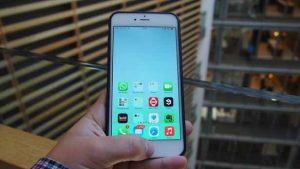iPhone 6 Plus Review - Performance Review
Performance
Are your pockets deep enough for Apple's plus size model?

Sections
- Page 1 iPhone 6 Plus Review
- Page 2 Screen Review
- Page 3 Performance Review
- Page 4 iPhone 6 Plus: iOS 8 Review
- Page 5 Camera Review
- Page 6 Battery Life and Verdict Review
iPhone 6 Plus: Performance
Apple’s new A8 processor powers the iPhone 6 Plus. It’s an excellent system on a chip (SoC) that provides oodles of grunt for high definition 3D gaming and means that the iPhone 6 Plus is butter smooth in day-to-day operation.
If you just looked at the numbers you’d be forgiven for believing that the iPhone 6 Plus is a lot less powerful than the Android competition. The A8 is a dual-core processor running at 1.4GHz and is supported by just 1GB of RAM. It sounds paltry when compared to the quad-core 2.5GHz Snapdragon 801 and 2GB RAM of the Galaxy S5.
In fact, the iPhone 6 Plus performs better than the Samsung in some graphic intensive tasks like playing games. 
Interestingly, the iPhone 6 Plus also performs a little better in our like-for-like processor tests when compared to its little brother. The wins are small though, just a few percent points.
In the 3D Mark Ice Storm Unlimited benchmark the 6 Plus scores a hefty 17,740 while it manages 2,871 on Geekbench 3. These are very high scores, on par with the Samsung Galaxy S5, which is the fastest of big-name Android flagship phones, and almost 30% faster than the iPhone 5S before it.
The biggest benefits of the A8 SoC, though, come from its graphical performance. The quad-core PowerVR GPU from Imagination Technologies is perfect for high intensity 3D gaming. Games look and perform brilliantly on the 5.5-inch HD screen.
The increased performance comes with some other benefits, too. Touch ID, Apple’s fingerprint recognition feature, unlocks your phone quicker than it does on the iPhone 5S.
The iPhone 6 Plus also uses an M8 co-processor, a tiny processor that keeps track of all data created by the array of sensors. Apple has added a new measurement into the mix, a barometer. This means that the 6 Plus can also recognise altitude, so it knows if you’ve been climbing stairs or hills. Fitness tracking apps can now hook into this information to provide more accurate information about your exercise regime.
The clever thing about the M8 processor is that it’s energy efficient. Battery life would be compromised if sensor data was constantly processed by the main A8 processor. It means that when you’re not doing much with your phone your battery doesn’t drain as quickly. It restricts phone functions when it knows your phone hasn’t moved for a while and is in an area with no signal. Clever stuff.
One feature that some may find lacking from the iPhone 6 Plus is the digitiser stylus. The Galaxy Note series is famous for it and while some people find it useful many others rarely use it. It is a useful addition and if you like taking hand-written notes, drawing or using a pen rather than a keyboard you might want to wait for the Galaxy Note 4.
iPhone 6 Plus: Storage and Pricing
Apple has never provided the option of adding a microSD card into its phones and the iPhone 6 Plus is no exception. If you like to store loads of music, games or movies on your phone you’ll need to pay for the extra storage up front.
It comes in three capacities: 16GB, 64GB and 128GB and that final version costs a fortune. In fact at £789/$949 for the top model the iPhone 6 Plus is the most expensive major smartphone we’ve ever seen. Unfortunately, the 16GB model (£619/$749) only provides around 11GB of storage after iOS 8 takes its cut. This means the 64GB model is the one to get. At £699/$849 it’s not exactly cheap, but 64GB should be enough for all but the most avid mobile media hoarder.
Next: iPhone 6 Plus iOS 8
How we test phones
We test every mobile phone we review thoroughly. We use industry standard tests to compare features properly and we use the phone as our main device over the review period. We’ll always tell you what we find and we never, ever, accept money to review a product.


